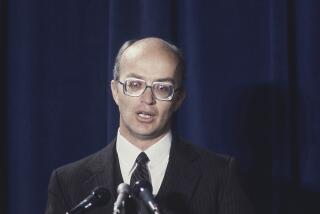Ex-Atty. Gen. Smith Covert Policy Input Held Restricted
- Share via
WASHINGTON — Early in the Reagan Administration, then-Atty. Gen. William French Smith was blocked from fully considering legal implications of covert foreign policy operations, the Justice Department’s former counsel for intelligence policy disclosed Thursday.
The result, Richard K. Willard said, was a “seriously flawed” process that excluded “adequate legal advice.” And he added: “The ultimate result was the Iran-Contra affair.”
Smith “regularly complained” to White House staff and leading National Security Council members about being shut out but “did not have much success” in breaking through the barriers, Willard told the American Bar Assn.’s standing committee on law and national security.
Casey Plays Role
Former CIA Director William J. Casey played a leading role in trying to keep Smith out of the process, Willard said in a telephone interview from Houston, where he delivered his remarks.
“Casey, in particular, felt these matters should not be excessively legalized,” Willard said in his speech, a text of which was made available in Washington. Smith, who has returned to private practice in Los Angeles, did not return a reporter’s call about Willard’s remarks.
The disclosures provide an extraordinary account of an Administration in which officials were able to keep the nation’s chief law enforcement officer and longtime adviser of Ronald Reagan in the dark about some of its most sensitive clandestine undertakings.
Moreover, the remarks by Willard, who later became assistant attorney general in charge of the Justice Department’s civil division, lend detailed support for the conclusion of the presidential commission headed by former Sen. John Tower (R-Tex.) that the Administration’s process for making national security decisions was seriously flawed, particularly where crucial legal questions should have been addressed.
Panel Conducts Inquiry
The Tower Commission conducted an inquiry after disclosures that the United States had secretly sold arms to Iran and diverted proceeds to rebels seeking to overthrow Nicaragua’s government.
Willard said that Smith was not a full member of the Cabinet group--sometimes the National Security Council and other times the wider National Security Planning Group--that considered sensitive foreign policy and intelligence matters, including covert operation proposals, “but was only ‘invited’ to attend.”
Smith’s successor, Atty. Gen. Edwin Meese III, did become a member of the group, but “even then some effort was made to insist that he was a member in his personal capacity and not as attorney general,” Willard said.
Because of Smith’s “uncertain status” in the intelligence process, his Justice Department subordinates “were generally excluded from working groups and sub-Cabinet level deliberations,” said Willard, who left the Justice Department in February for private practice.
Omits Staff Persons
Smith was not allowed to bring any staff person to the meetings he was invited to attend, on grounds that the sessions were for “principals only,” Willard said, though he added that there appeared to be exceptions to this rule for the White House and CIA staff.
Background papers on matters to be discussed at the meeting generally were sent to Smith just before the sessions, “if then, and were often too short and poorly written,” Willard said.
“The cumulative effect of these restrictions was to minimize the ability of the attorney general to participate in the deliberations or to render meaningful legal advice,” Willard said.
“He was even asked at times to render off-the-cuff oral advice on complex legal situations. The obvious desire was to be able to claim that the attorney general had given a legal seal of approval to various proposals without permitting them to undergo real legal scrutiny,” he added.
Receive Casual Review
Willard told his lawyers audience that “it also appeared that the most sensitive kinds of foreign policy and intelligence matters received fairly casual staff review and coordination.”
“Smith regularly complained about these systemic shortcomings in a series of letters to the White House staff and principal members of the NSC in 1981-82,” Willard said, adding that he “was fairly forceful on these points in meetings as well,” but without “much success.”
Willard linked the problem to a widespread fear of leaks, which fed efforts to restrict participation in the national security decision-making process.
“Many in the intelligence community blamed the Department of Justice for failing to vigorously investigate and prosecute leak cases,” Willard said. “This perceived failure was a continuing irritant that hampered my efforts to improve the working relationship between the department and the intelligence community.”
More to Read
Get the L.A. Times Politics newsletter
Deeply reported insights into legislation, politics and policy from Sacramento, Washington and beyond. In your inbox three times per week.
You may occasionally receive promotional content from the Los Angeles Times.










